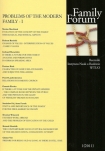Charakter relacji rodzinnych a dobrostan psychiczny
Character of family relationships and subjective well-being
Author(s): Dariusz KrokSubject(s): Christian Theology and Religion
Published by: Uniwersytet Opolski
Keywords: family relationships; subjective well-being; happiness; marriage; parents-child relationships
Summary/Abstract: This article reviews theoretical and empirical advances in research on the character of family relationships and subjective well-being. The concept of subjective well-being is defined in accordance with the traditional approach as a category that includes a cognitive evaluation of one’s life and the balance of positive emotions relative to negative emotions. This term has received a growing interest in the psychological research on human happiness reflecting the perpetual human tendency to search for factors that contribute to our quality of life. The relations between family relationships and well-being are presented in three dimensions describing the following interactions: husband – wife, parents – children, and among siblings. The analyses of husband – wife relationships suggest that these interactions affect their well-being at multiple levels. Although the relations between marriage and subjective well-being is well recognized, the effect sizes are rather small. It is a result of other factors moderating the relations e.g. social classes, age, culture, timing of live events, social expectations. A well-established findings regarding parents and children point out that the parents’ relationships of support, warmth, and intimacy positively influence their children’s well-being. Family relationships are changed from more hierarchical relationships at the beginning of adolescence to more egalitarian relationships by late adolescence. The research on siblings shows that better relationships with brothers and sisters lead to better adjustment during childhood, adolescence, and adulthood. Even after controlling for level of parental and peer support, greater support from siblings is associated longitudinally with higher levels of emotional and social support and better adjustment. The results point at positive connections between siblings’ helpful and affirmative relationships and their well-being.
Journal: Family Forum
- Issue Year: 2011
- Issue No: 1
- Page Range: 63-78
- Page Count: 16
- Language: Polish

